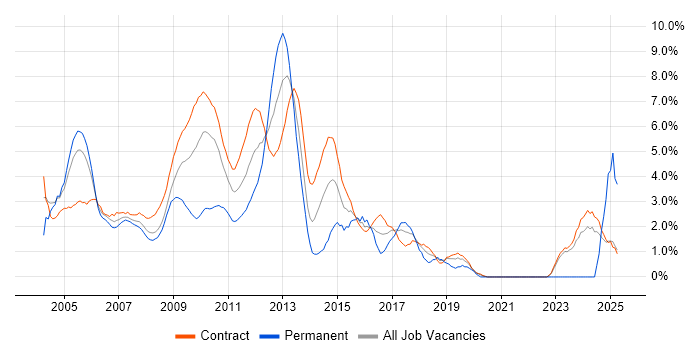Unified Modeling Language (UML)
Tower Hamlets > Canary Wharf
The table below provides summary statistics for contract job vacancies advertised in Canary Wharf requiring UML skills. It includes a benchmarking guide to the contractor rates offered in vacancies that cited UML over the 6 months leading up to 2 May 2025, comparing them to the same period in the previous two years.
| 6 months to 2 May 2025 |
Same period 2024 | Same period 2023 | |
|---|---|---|---|
| Rank | 13 | 22 | - |
| Rank change year-on-year | +9 | - | - |
| Contract jobs citing UML | 1 | 2 | 0 |
| As % of all contract jobs advertised in Canary Wharf | 1.89% | 1.82% | - |
| As % of the Processes & Methodologies category | 2.08% | 1.87% | - |
| Number of daily rates quoted | 1 | 2 | 0 |
| Median daily rate (50th Percentile) | £540 | £540 | - |
| Tower Hamlets median daily rate | £540 | £540 | - |
All Process and Methodology Skills
Canary Wharf
UML falls under the Processes and Methodologies category. For comparison with the information above, the following table provides summary statistics for all contract job vacancies requiring process or methodology skills in Canary Wharf.
| Contract vacancies with a requirement for process or methodology skills | 48 | 107 | 51 |
| As % of all contract IT jobs advertised in Canary Wharf | 90.57% | 97.27% | 83.61% |
| Number of daily rates quoted | 44 | 103 | 43 |
| 10th Percentile | - | £450 | £224 |
| 25th Percentile | £495 | £531 | £498 |
| Median daily rate (50th Percentile) | £585 | £585 | £550 |
| Median % change year-on-year | - | +6.36% | -12.00% |
| 75th Percentile | £630 | £650 | £722 |
| 90th Percentile | £638 | £770 | £800 |
| Tower Hamlets median daily rate | £585 | £590 | £578 |
| % change year-on-year | -0.76% | +2.08% | +10.00% |
| Number of hourly rates quoted | 1 | 0 | 0 |
| Median hourly rate | £40.00 | - | - |
| Tower Hamlets median hourly rate | £40.00 | - | - |
UML
Job Vacancy Trend in Canary Wharf
Job postings citing UML as a proportion of all IT jobs advertised in Canary Wharf.

UML
Contractor Daily Rate Trend in Canary Wharf
3-month moving average daily rate quoted in jobs citing UML in Canary Wharf.
UML
Co-occurring Skills and Capabilities in Canary Wharf by Category
The follow tables expand on the table above by listing co-occurrences grouped by category. The same employment type, locality and period is covered with up to 20 co-occurrences shown in each of the following categories:
|
|
|||||||||||||||||||||||||||||||||||||||||||||||||||||||||
|
||||||||||||||||||||||||||||||||||||||||||||||||||||||||||
